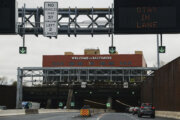LOLITA C. BALDOR
Associated Press
WASHINGTON (AP) — The White House and the Pentagon are grappling with how to explain what American military forces are doing and could do in Iraq as they battle the Islamic State militants.
Speaking at U.S. Central Command on Wednesday, President Barack Obama reiterated his pledge to keep American troops out of combat missions. But hours later, Vice President Joe Biden appeared to be less certain about ground troops.
“We’ll determine that based on how the effort goes,” Biden told reporters in Iowa.
Biden’s remarks echoed comments a day earlier from Army Gen. Martin Dempsey, the Joint Chiefs chairman, who said he may, if necessary, recommend to the president that U.S. ground forces accompany Iraqi troops on attacks against Islamic State targets, particularly in certain complex missions or if there were threats to the U.S.
The statements have raised questions about possible splits between the president and some of his top advisers. But at least some of the confusion can be chalked up to differences in how the military talks about what it does.
__ There are already combat troops in Iraq. U.S. military members are, by definition, combat forces. There are more than 1,100 U.S. troops in Iraq and 475 others are heading in. Many are doing security and working in joint operations centers in Baghdad and the Kurdish capital of Irbil, and are not carrying out routine combat operations.
__ Others, however, are forming at least 12 teams that will embed with Iraqi brigades and headquarters units to advise and assist them in the fight. Those teams would be battle-ready, but because they are with headquarters or commanding units, they aren’t likely to engage in direct combat with the enemy, and they are not authorized to travel with Iraqi units if direct contact with the enemy is expected or probable.
__ The U.S. has been launching airstrikes for weeks into Iraq, using fighter jets, bombers and drones. The pilots and crews of those Air Force and Navy aircraft are dropping bombs on enemy fighters and positions, so are clearly engaged in combat. But they are largely out of harm’s way and are not involved in ground combat.
__ When asked this week, Dempsey said that under certain circumstances he might recommend to the president that the U.S. send in some ground forces to assist the Iraqis. He was careful in how he described the possibilities, referring mainly to small teams of special operations forces who could embed with Iraq units to help guide and assist them in complex military operations. Special operations forces do this all the time, including in war zones, in covert operations around the globe and at times in highly secretive assignments when they are technically assigned to the CIA.
__ The pledge to not send U.S. ground forces into Iraq is meant to assure the American public that the U.S. will not get involved in another deadly ground war, where military units with flags flying and tanks rumbling, storm into a country, sending U.S. troops to battle enemy fighters. From a military standpoint, it does not rule out small teams or groups of troops working with local forces or engaging in covert or other limited emergency operations that could be authorized by the president.
Copyright 2014 The Associated Press. All rights reserved. This material may not be published, broadcast, rewritten or redistributed.







